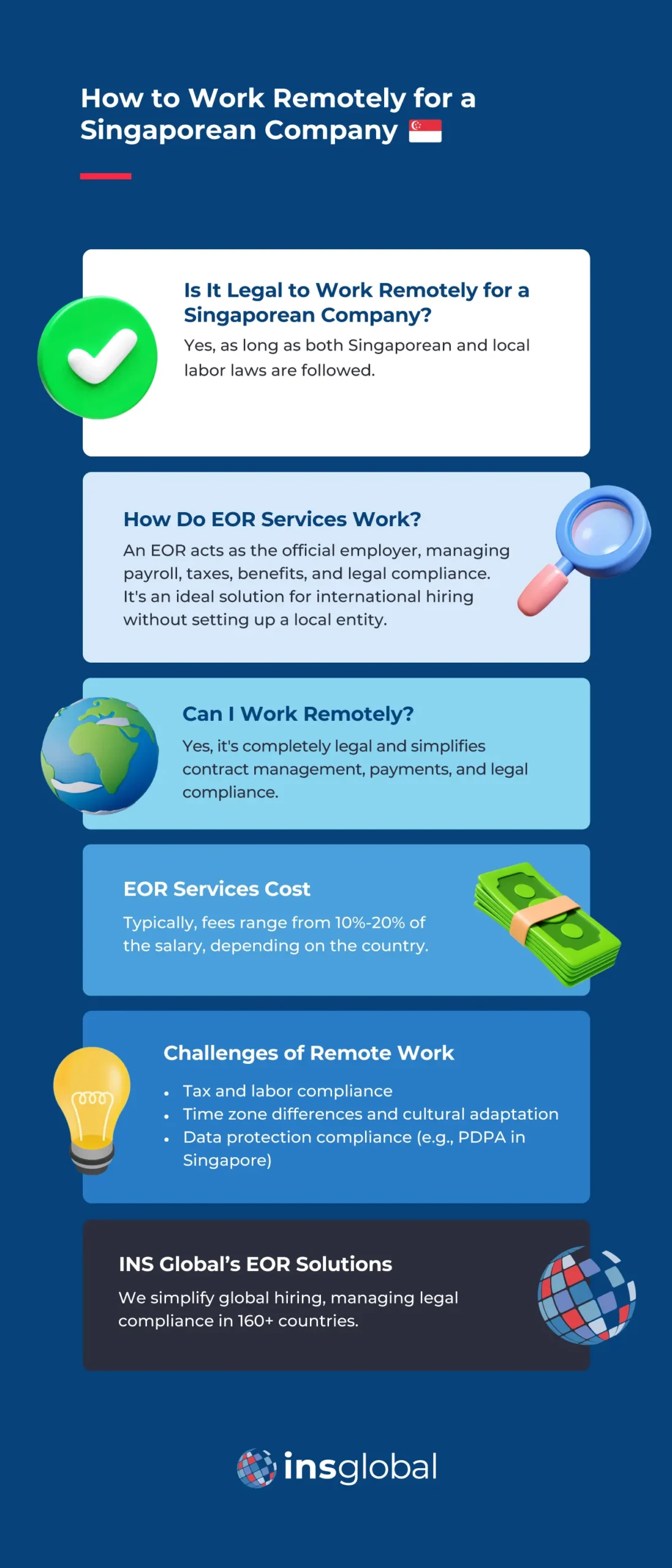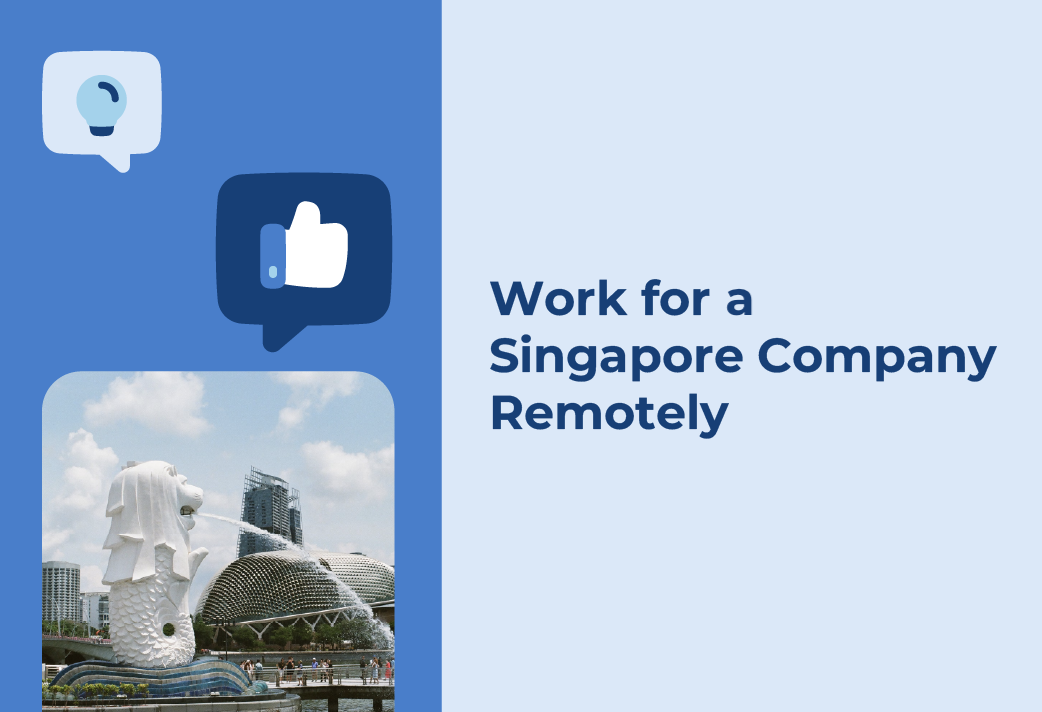More and more Singaporean employers are looking to hire global talent, with modern technology making this now possible from anywhere in the world. This shift makes the option to work for a Singaporean company remotely easier and offers unparalleled flexibility, enabling individuals to pursue opportunities without geographical constraints.
If you are considering working for a Singaporean company remotely, it is essential to understand the logistics, legalities, and potential challenges involved in such a decision. To this end, this comprehensive guide will cover big questions you might be asking and offer a helpful alternative to traditional options.

Tired of scrolling? Download a PDF version for easier offline reading and sharing with coworkers
Is It Legal for Me to Work for a Singaporean Company Remotely While Overseas?
Yes, in most cases, It is possible to work remotely for a Singaporean company from another country. In fact, a growing number of Singaporean businesses are welcoming the chance to recruit foreign workers in order to take advantage of new perspectives and skill sets.
However, there are a number of important factors to take into account when working remotely for a Singaporean company, such as employment laws, tax obligations, and legal requirements.
To ensure the safety of both you and the Singaporean company involved, you must be able to abide by Singaporean and your home country’s employment rules.
How do Employer of Record Services Work?
If they already have a company entity in your country of residence, your Singaporean employer may be able to hire you directly. However, hiring can also happen through an Employer of Record (EOR) service or as an independent contractor.
As an independent contractor, you will be responsible for handling your own taxes and benefits; nevertheless, you also have legal obligations in both countries. However, these details can be taken care of, and the hassles can be avoided by going through an EOR service provider instead.
For a streamlined approach, our Employer of Record in Singapore solution ensures legal compliance while you work remotely. An EOR is generally a third-party corporation that acts as another company’s official employer to take care of all employment-related duties, such as payroll, taxes, benefits, and local labor law compliance. Often used by companies seeking to enter a foreign market where they don’t already have an entity, EOR support means businesses can hire foreign workers without having to set up a legal corporation or manage extra HR processes in a worker’s home country.

Specifically, Can I Work Remotely for a Singaporean Company Through an EOR?
Using an EOR to work remotely for a Singaporean company is perfectly legal according to Singaporean labor law, making it a sensible and growing strategy.
In these cases, an employment contract is signed and managed by the EOR service, which also makes sure it complies with local laws. In addition, they manage social security contributions, payroll processing, tax withholding, employee onboarding, and any other legal obligations.
Most importantly, the EOR offers a streamlined employment experience for the employee and employer, freeing them to concentrate on their work without having to worry about complicated legal and administrative matters.
However, it’s important to note that the exact situation also depends on the labor law of your country of residence, as other countries may have different requirements concerning this type of employment relationship.
How Much Do EOR Services Cost?
The exact figure will depend on a number of factors, as EOR service providers typically levy a fee that is determined according to a percentage of the employee’s pay, typically between 10% and 20%, though this will depend on the country of residence and services required as the EOR will be expected to cover varying costs such as tax and social security compliance.
In some cases, EORs may impose a fixed monthly cost on each employee, though this is more common in situations concerning many employees.
Setup fees, statutory perks, and any particular compliance requirements in the employee’s home country all have to be considered when calculating an EOR service package.
However, while working with an EOR involves a certain level of cost, they are typically less expensive than the price and complications of establishing a legal company in a foreign nation and making sure all local law regulations are followed.
What are the Limitations and Risks I Might Face When I Work for a Singaporean Company Remotely?
Tax Compliance
Navigating the legal and tax landscapes of both Singapore and your home country where you are resident for tax purposes can be intricate and demanding. Both employers and employees must be able to adhere to respective local laws, which often involves understanding bilateral agreements or tax treaties between countries.
This complexity extends to handling tax filings accurately and promptly to avoid potential fines and legal issues. Missteps in compliance can lead to significant financial penalties and legal repercussions, making it essential to seek expert advice in international tax law.
Employment Law Compliance
Adhering to the diverse labor laws of different countries is another major challenge. Each country has its own set of regularly evolving employment laws regarding employee rights, benefits, and protections.
For example, misclassification of employment status, including incorrectly identifying someone as a contractor instead of an employee, can lead to severe legal complications and financial penalties.
Ensuring compliance with all relevant labor laws in Singapore and your country of residence requires careful attention and often the assistance of legal professionals to navigate these regulations effectively.
Time Zone Differences and Communication
While Singapore’s time zone may be convenient when working in many large global markets, coordinating work schedules can be difficult, as significant gaps can hinder real-time collaboration and communication.
To bridge these gaps, it is crucial to employ effective communication techniques, such as regular check-ins, flexible working hours, and the use of collaborative tools. Overcoming these time zone challenges ensures that workflow remains smooth and productivity is maintained.
Cultural Adaptation
Understanding and integrating into the corporate culture of a Singaporean company can be challenging, particularly when working remotely. Cultural differences can impact communication styles, work ethics, and workplace expectations as you work for a Singaporean company remotely. Overcoming these barriers requires effort and effective communication skills.
As a result, it’s important to be aware of and sensitive to cultural nuances in the workplace, even when that happens in a digital space. Actively engage in understanding the corporate culture of Singapore and ensure you are clear about your own culture’s work background to foster a harmonious and productive working relationship.
Data Security and Privacy Compliance
Ensuring data security and compliance with Singapore’s stringent data protection laws is critical when working remotely. Singapore’s PDPA (Personal Data Protection Act) places a strong emphasis on the protection of personal and corporate data, and non-compliance can lead to severe penalties.
Ensuring you and your employer maintain strong data security measures, such as secure communication channels, regular software updates, and stringent access controls, is essential. Remote workers must be particularly diligent in following data protection protocols due to the need to regularly send and receive data and safeguard sensitive information in line with multiple legal requirements.
Why Go Global with World-Class EOR Services from INS Global?
INS Global’s Employer of Record services provides a comprehensive solution for companies looking to hire talent worldwide. Our local provider manages all employment-related responsibilities by serving as the legitimate employer for workers in 160+ countries worldwide, guaranteeing adherence to regional laws and tax liability ordinances.
With the help of our professional services and nearly 20 years of industry-leading experience, recruiting foreign workers is easier for businesses, enabling businesses and workers to grow internationally without having to set up legal entities everywhere.
Because INS Global offers a smooth and legally compliant hiring process, everyone involved can concentrate on their work without having to worry about complicated legal and administrative matters.
Contact our expert expansion advisors today to see how our global EOR services can help companies grow quickly, easily, and safely.
FAQ
A Specific Example – Can I Work for a Singaporean Company Remotely from a Foreign Country?
Yes, international nationals are able to work for Singaporean companies remotely while residing overseas using a number of methods.
For example, if you are an independent contractor operating out of the United States, you may be required to register your firm and pay self-employment taxes in accordance with U.S. tax regulations. One way to prevent double taxation is to be aware of Singaporean-US tax treaties or outsource these concerns to a professional HR service.
A Specific Example – Can I Live in Singapore and Work for a Foreign Company?
It’s also possible to live in Singapore and work for a foreign corporation, though extra processes may be involved, including seeking specific visas for foreign workers. Given this situation, it’s crucial to pay close attention to Singapore’s residency restrictions, tax systems, and employment laws.
Most importantly, you’ll have to ascertain your tax residency status if you live in Singapore and work for a foreign corporation. Singapore requires its citizens to submit their international income to the Inland Revenue Authority of Singapore (IRAS) since the country levies worldwide revenue, and foreign workers will be subject to salary requirements if they aren’t Singaporean citizens.


SHARE